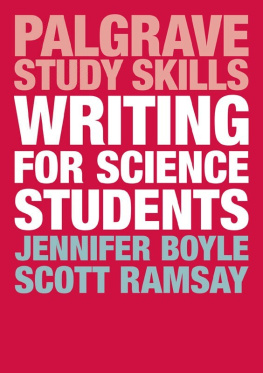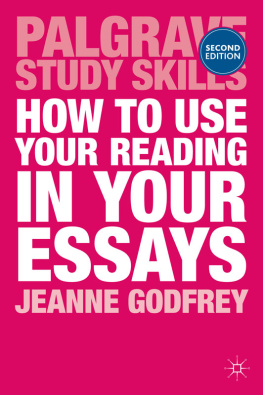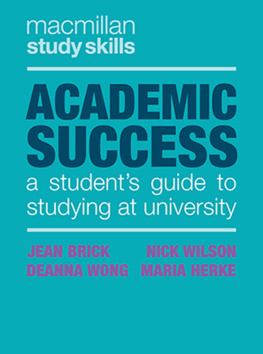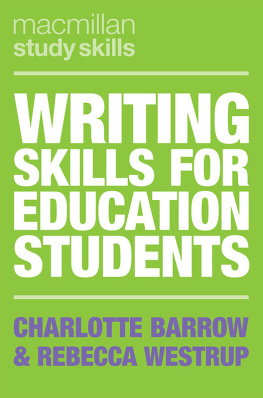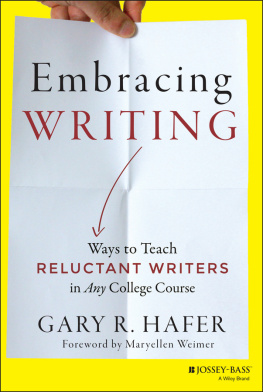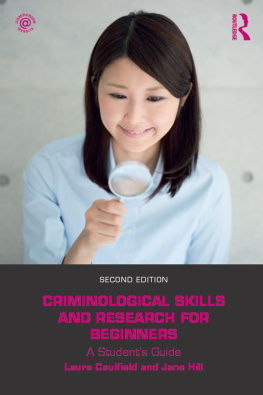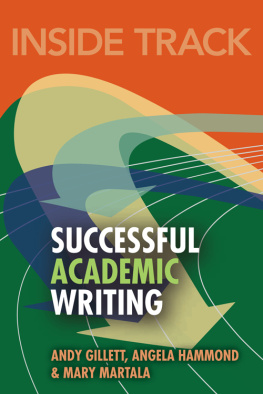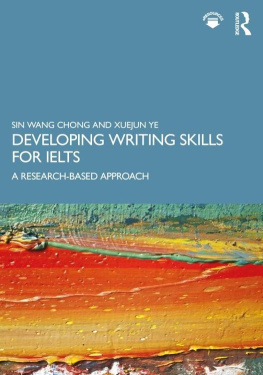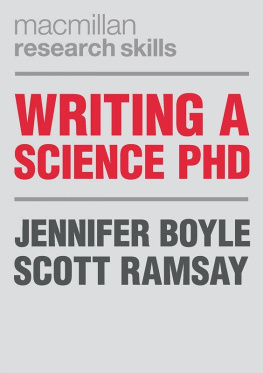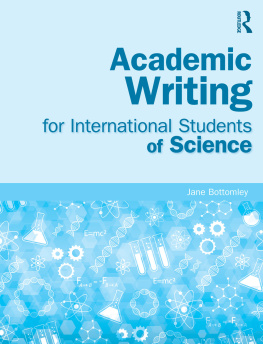Writing for Science Students
For a complete listing of all our titles in this area please visit www.palgravehighered.com/study-skills
Palgrave Study Skills
Business Degree Success
Career Skills
Cite Them Right (10th edn)
Critical Thinking Skills (3rd edn)
Dissertations and Project Reports
e-Learning Skills (2nd edn)
The Exam Skills Handbook (2nd edn)
Get Sorted
The Graduate Career Guidebook
Great Ways to Learn Anatomy and Physiology (2nd edn)
How to Begin Studying English Literature (4th edn)
How to Study Foreign Languages
How to Study Linguistics (2nd edn)
How to Use Your Reading in Your Essays (2nd edn)
How to Write Better Essays (3rd edn)
How to Write Your Undergraduate Dissertation (2nd edn)
Improve Your Grammar (2nd edn)
Information Skills
The International Student Handbook
The Mature Students Guide to Writing (3rd edn)
The Mature Students Handbook
The Palgrave Student Planner
The Personal Tutors Handbook
Practical Criticism
Presentation Skills for Students (3rd edn)
The Principles of Writing in Psychology
Professional Writing (3rd edn)
Researching Online
Skills for Success (3rd edn)
Smart Thinking
The Students Guide to Writing (3rd edn)
The Student Phrase Book
Study Skills Connected
Study Skills for International Postgraduates
Study Skills for Speakers of English as a Second Language
The Study Skills Handbook (4th edn)
Studying History (3rd edn)
Studying Law (4th edn)
Studying Modern Drama (2nd edn)
Studying Psychology (2nd edn)
Success in Academic Writing
Teaching Study Skills and Supporting Learning
The Undergraduate Research Handbook
The Work-Based Learning Student Handbook (2nd edn)
Work Placements A Survival Guide for Students
Write it Right (2nd edn)
Writing for Engineers (3rd edn)
Writing for Law
Writing for Nursing and Midwifery Students (2nd edn)
Writing History Essays (2nd edn)
You2Uni: Decide. Prepare. Apply
Pocket Study Skills
14 Days to Exam Success
Analyzing a Case Study
Brilliant Writing Tips for Students
Completing Your PhD
Doing Research
Getting Critical (2nd edn)
Planning Your Dissertation
Planning Your Essay (2nd edn)
Planning Your PhD
Posters and Presentations
Reading and Making Notes (2nd edn)
Referencing and Understanding Plagiarism
Reflective Writing
Report Writing
Science Study Skills
Studying with Dyslexia
Success in Groupwork
Time Management
Wheres Your Argument?
Writing for University (2nd edn)
Palgrave Career Skills
Excel at Graduate Interviews
Writing for Science Students
Jennifer Boyle and Scott Ramsay

Jennifer Boyle and Scott Ramsay 2017
All rights reserved. No reproduction, copy or transmission of this publication may be made without written permission.
No portion of this publication may be reproduced, copied or transmitted save with written permission or in accordance with the provisions of the Copyright, Designs and Patents Act 1988, or under the terms of any licence permitting limited copying issued by the Copyright Licensing Agency, Saffron House, 610 Kirby Street, London EC1N 8TS.
Any person who does any unauthorized act in relation to this publication may be liable to criminal prosecution and civil claims for damages.
The authors have asserted their rights to be identified as the authors of this work in accordance with the Copyright, Designs and Patents Act 1988.
First published 2017 by
PALGRAVE
Palgrave in the UK is an imprint of Macmillan Publishers Limited, registered in England, company number 785998, of 4 Crinan Street, London, N1 9XW.
Palgrave and Macmillan are registered trademarks in the United States, the United Kingdom, Europe and other countries.
ISBN 9781137571519 paperback
This book is printed on paper suitable for recycling and made from fully managed and sustained forest sources. Logging, pulping and manufacturing processes are expected to conform to the environmental regulations of the country of origin.
A catalogue record for this book is available from the British Library.
A catalog record for this book is available from the Library of Congress.
List of Figures
List of Tables
List of Boxes
Acknowledgments
In writing this book, we consulted with many colleagues, both at the University of Glasgow and beyond. In particular, we would like to thank Dr Chris Finlay and Dr Mary McVey from the School of Life Sciences, and Dr Eric Yao from the School of Physics and Astronomy. The experiences they shared of grading and giving feedback to large first-year classes were instrumental in shaping the sections of the book that orient readers with the expectations of a marker. Additionally, their feedback on our critical analysis chapter was indispensable.
We would also like to thank Dr Amanda Sykes and, from Edinburgh Napier University, Dr Anne Tierney, prior collaborations with whom formed the basis for our advice on how to incorporate other peoples work.
Another long-time classroom collaborator, Heather Worlledge-Andrew, helped to inform the chapters on finding materials. As a former Subject Librarian for the College of Medical, Veterinary and Life Sciences at the University of Glasgow, the experience she has shared over the years in the intricacies of how to sensibly find and access journal articles was invaluable.
Finally, we would like to thank our PhD supervisors, Dr Peter Dominy and Dr Marilyn Dunn, who played such a large part in helping us to shape our own writing styles during the course of writing our PhD dissertations.
Chapter
Introduction
Top 3 staff comments on scientific writing:
We offer guidance on writing in class, but until students actually have a go at it themselves, it still seems natural that they will panic.
Overall quality of written work is often poor, which is frustrating when we can see that the students have the necessary scientific knowledge. We cant give full marks.
Lab reports are the classic example of what scientific writing means, but they make up only a very small part of a successful scientists written output.
Top 3 student comments on scientific writing:
I didnt really enjoy English at school, so Im not looking forward to having to write.
The structure and format confuses me what information should go where?
Its hard to express complicated things clearly without just quoting from someone else.
Pick up this book if you want something designed to meet the specific needs of science students. There are plenty of writing guides for the university audience, but most of them cater to students who spend their whole lives writing essays: students in the arts and the humanities. Scientific degrees dont work that way, and scientific writing doesnt look the same as theirs.
This book actively works to give you an understanding of scientific writing from start to finish, and an understanding of what your markers want. Its divided into three sections: Understanding Scientific Writing, Preparing to Write, and Getting Down to Writing. The sections are designed to take you through every stage of the writing process, from understanding the assignment youve been set, to researching and planning, right through to drafting and editing.
Where relevant, weve incorporated example scientific sentences and paragraphs to help illustrate our points and solidify your understanding.
Next page
